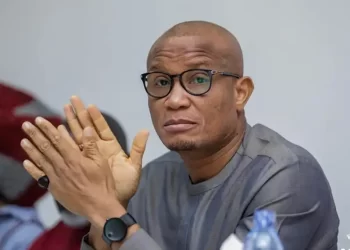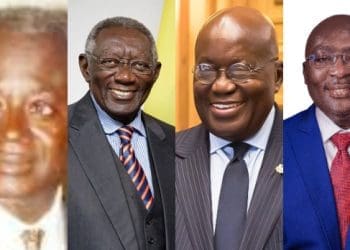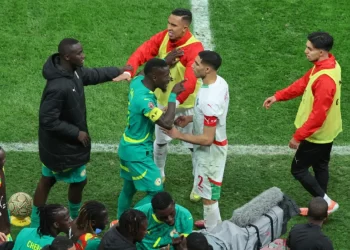Suspended Chief Justice Gertrude Torkornoo has publicly broken her silence, outlining four key reasons she believes will lead to her controversial removal from office.
In a strongly worded statement when she addressed the press, Justice Torkonoo expressed deep disappointment over what she described as a politically motivated and unjust process aimed at discrediting her integrity and undermining the judiciary.
According to her statement, the reasons behind her removal are as follows.
1. She described the ongoing proceedings for her removal as not only unprecedented but also deeply troubling for Ghana’s democratic development. She emphasised that in the entirety of Ghana’s 68 years as an independent republic, no Chief Justice has ever faced such a process.
She argued that such a historic moment should have served as a model for transparency, legality, and institutional maturity. Instead, Torkornoo expressed concern that the steps taken so far have disregarded established legal principles and the very foundation of justice delivery in the country.
“This process could have set a positive precedent for national governance,” she said, “but instead, it is unfolding in a way that violates constitutional safeguards and legal norms.”
The former head of the judiciary warned that these violations pose a serious threat to the rule of law and democratic progress.
Her remarks are expected to intensify public scrutiny of the legality and fairness of the process that led to her suspension.
2. On her second reason, Justice Gertrude Torkonoo raised alarm, stressing that the process extends beyond her as an individual and could have lasting consequences for Ghana’s democratic institutions.
In a detailed statement, Justice Torkonoo emphasised that the outcome of her case could redefine how top judicial officers and heads of independent constitutional bodies are treated under the law. She cautioned that her suspension threatens to undermine the constitutional safeguards designed to protect certain public officials from undue influence.
“This is not just about me,” she said. “The consequences of this process will shape how current and future judges of the High Court, Court of Appeal, Supreme Court, and Chief Justices are removed from office. It also has implications for the security of tenure of heads of key constitutional bodies whose roles are to uphold the rights and freedoms of Ghanaian citizens.”

Justice Torkonoo pointed to the framers of the 1992 Constitution, who, in building the Fourth Republic, intentionally created a framework that shields a select group of officials from political interference. These officials, she explained, were meant to serve the public interest freely and fearlessly, without the threat of retaliation from powerful individuals in the executive or legislative branches.
She underscored that the Constitution does not grant any authority the power to arbitrarily terminate the appointments of these officials. Instead, Article 146 outlines a strict and objective procedure for removal — only on the grounds of proven “inability to perform the functions of their office.”
The positions affected by these protections include:
- Justices of the High Court, Court of Appeal, and Supreme Court
- The Commissioner and Deputy Commissioners of the Commission on Human Rights and Administrative Justice (CHRAJ)
- The Auditor-General
- The Chairman, Vice-Chairman, and members of the Public Services Commission
- The Commissioner and Deputy Commissioners of the Electoral Commission
- The Commissioner and Deputy Commissioners of the National Commission for Civic Education
Torkonoo’s remarks have reignited debate over judicial independence and the integrity of democratic checks and balances. Legal analysts and civil society groups warn that if her concerns are not adequately addressed, Ghana risks eroding the very principles of freedom and justice the Constitution was designed to protect.
3. Speaking on her third reason for removal, Torkonoo alleged serious violations of her constitutional rights in the ongoing proceedings surrounding her removal from office.
She cited efforts to challenge what she describes as a flawed and unlawful process, revealing that she had petitioned the Supreme Court to hold the hearings in public rather than behind closed doors.
According to Justice Torkonoo, she initiated legal action at the Supreme Court to compel the committee—set up by the President under Article 146—to conduct its proceedings transparently. She argued that the process had shown clear signs of constitutional violations from the outset, beginning with the manner in which she was suspended and the committee began its work.
“I requested that the hearings be held in public,” she explained, “not to defy convention, but because the Constitution does not intend for the in-camera rule to become a cloak for abuse or a shield for hidden agendas.”
She maintained that none of the issues raised in the petitions against her involved sensitive matters of national security or public safety—grounds on which the Constitution might justify private hearings.
Justice Torkonoo added that the contents of the petitions had already been widely debated in the media before the committee’s first session, reinforcing her view that secrecy was unnecessary and counterproductive. She later submitted a supplementary affidavit to the Supreme Court, citing human rights violations she had begun to experience in the process. However, the court dismissed her request for a public hearing and struck out her affidavit upon the Attorney-General’s application.

She said she was compelled to go public due to what she described as “escalating violations” of her rights that far exceed what she imagined possible under Ghana’s justice system.
Among the violations she outlined were:
- Denial of legal representation: On the first day of the hearing, her legal counsel was allegedly not recognised by the committee simply because she was not present in person. The committee went ahead to schedule hearings and make decisions without her lawyer’s involvement, despite his physical presence.
- Lack of clear charges: She said the committee failed to specify which allegations had formed a prima facie case or explain the reasoning behind those decisions—making it impossible for her to adequately prepare a defense.
- No cross-examination: Two petitioners—Mr. Daniel Ofori and Shining Stars were allegedly excused from testifying, denying her the opportunity to cross-examine them.
- Restricted support: She claimed she was not allowed to have her husband or a close family member with her during the hearings.
- Invasive searches: She described undergoing an invasive body and handbag search, which she argued violated established protocols and courtesies usually afforded to a Chief Justice, both in Ghana and internationally.
- Intimidating venue: The hearings were held in a high-security, restricted area on Castle Drive, Osu—a departure from the tradition of using Judicial Service facilities. Justice Torkonoo suggested this choice was intended to intimidate her and limit public oversight of the process.
4. Torkornoo, speaking on her fourth reason, dismissed widespread suggestions that she should step down from her position in the face of ongoing proceedings aimed at her removal.
In a strongly worded response, she revealed that she has been under immense pressure—from both well-meaning individuals and anonymous threats—to resign or retire to avoid what many believe is a politically orchestrated process to oust her.
According to Justice Torkonoo, some individuals close to her, as well as others observing from afar, have advised her to walk away from the role quietly, given what they describe as a predetermined and unfair process. She also disclosed receiving threats, including subtle warnings, suggesting she would suffer consequences if she refused to leave office voluntarily.
“There have been clear indications,” she noted, “that this process is part of a calculated political effort to take control of the judiciary, and that my removal has already been scripted.”
While expressing gratitude to those who have spoken out in concern for her well-being, the Chief Justice stressed that her continued presence in the process is not out of a desire to hold onto her title.
Instead, she views her stand as a matter of principle. With 38 years in legal practice, including 21 years on the bench, Justice Torkonoo said her experience obligates her to speak out against what she describes as a disturbing erosion of justice.
“The circumstances surrounding my case,” she stated, “have exposed me to a kind of injustice I never imagined could occur within our judicial system. This is why, despite the personal toll it takes, I feel compelled to respond decisively—with both legal insight and leadership.”
She also cited a Supreme Court precedent that prevents judges or public officials from resigning while Article 146 removal proceedings are ongoing. In her view, resigning would not only be legally impermissible but would also amount to abandoning a critical test of judicial independence in Ghana.
Justice Torkonoo’s decision to remain and challenge the proceedings underscores what many see as a broader struggle over the integrity of the judiciary and the rule of law in Ghana. Her stance is likely to fuel further national debate over judicial accountability, political interference, and the future of the country’s democratic institutions.
Statement by Chief Justice Sackey Torkornoo by emma tony on Scribd












